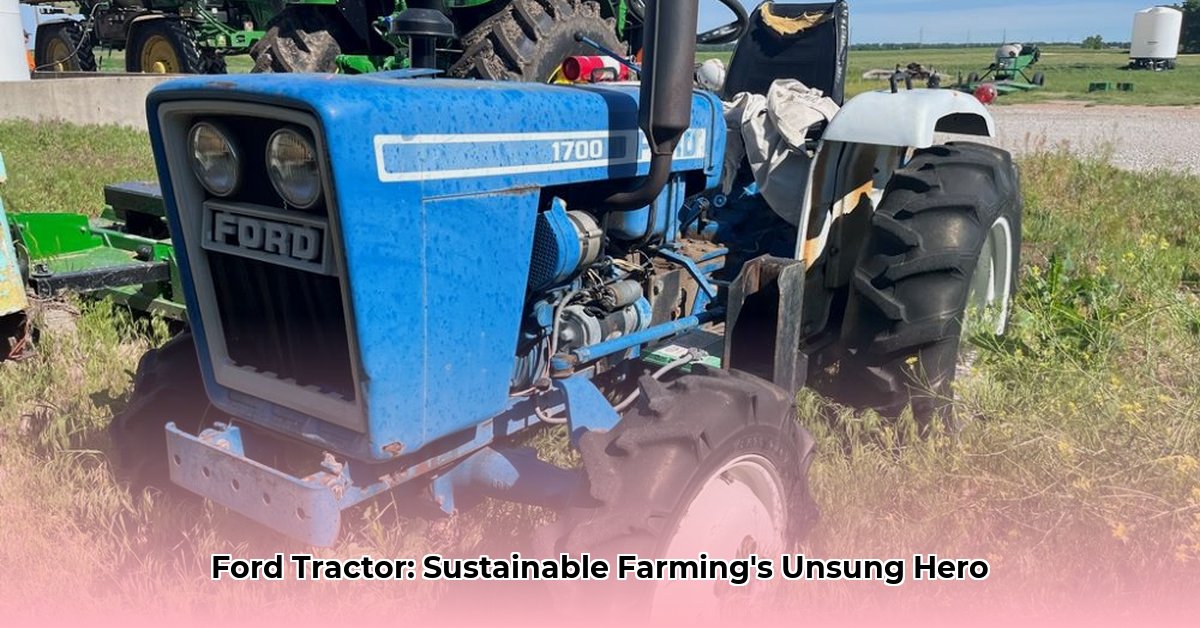
A Mechanized Legacy: Context and Innovation
The 1980 Ford tractor stands as a pivotal artifact in the mechanization of agriculture. Representing a high point in Ford's involvement in the sector, it embodied technological advancements that reshaped farming practices. However, evaluating its legacy requires a nuanced understanding of its impact on sustainability, exploring both its benefits and drawbacks. This analysis investigates the 1980 Ford tractor's technological advancements, its environmental and economic repercussions, and its broader social and cultural implications within the framework of sustainable agriculture. For more details on this specific model, see the 1980 Ford Tractor page.
Technological Advancements: Efficiency and Design
The 1980 Ford tractor showcased considerable advancements for its time. Improved engine efficiency, compared to predecessors, likely resulted in reduced fuel consumption per unit of work. This was a crucial factor for farmers facing rising fuel costs. Enhanced hydraulic systems offered greater precision in controlling attached implements, potentially leading to increased efficiency and reduced soil compaction. Finally, improved operator comfort features, such as enhanced seating and controls, aimed to boost productivity and reduce operator fatigue during prolonged workdays. These features reflected a clear focus on both operational efficiency and worker well-being. How did these improvements affect farming practices overall, particularly in comparison to competing technologies?
Environmental Impact: A Complex Equation
While the 1980 Ford tractor significantly boosted agricultural productivity, its environmental impact demands careful consideration. The manufacturing process itself consumed considerable resources and generated waste. Operational fuel consumption contributed to greenhouse gas emissions, a major concern in contemporary sustainability debates. Moreover, the eventual disposal of the tractor presented further environmental challenges. The widespread adoption of mechanized farming, facilitated by tractors like the 1980 Ford model, significantly altered landscapes, sometimes impacting natural habitats, soil health, and water resources. This raises the crucial question: did the increased efficiency offset the environmental trade-offs? Further research focusing on a lifecycle assessment (LCA) is needed to accurately quantify these impacts.
Economic Impact: Costs and Benefits for Farmers
The 1980 Ford tractor represented a substantial financial commitment for farmers. The initial purchase price was considerable, although farmers weighed this against potential gains in productivity and reduced labor costs. However, the long-term economic picture included fuel consumption, maintenance, repairs, and eventual resale value. While the increased acreage cultivation and potential for higher yields presented benefits, farmers also faced significant operating costs. The economic feasibility of adopting such technology varied widely based on farm size, crop type, and market conditions. A thorough economic sustainability analysis could illuminate the long-term financial implications for farmers.
Social and Cultural Impact: Shifting Agricultural Practices
The introduction of the 1980 Ford tractor contributed to broader social and cultural shifts in agriculture. The increased mechanization lessened the reliance on manual labor, affecting the rural workforce and labor practices. This transition had profound implications for rural communities, leading to both opportunities and challenges for local economies. Further research into the social history of this transition would provide valuable insights into the effects of mechanization on various agricultural communities.
Conclusion: A Balanced Perspective on Legacy
The 1980 Ford tractor's legacy is intricate and multifaceted. It undeniably increased agricultural productivity and efficiency, yet its environmental impact and broader implications for sustainability remain critical areas for discussion. Understanding its design, manufacturing process, operational characteristics, and eventual disposal is crucial for charting a path towards more environmentally responsible agricultural practices. Future research, including comprehensive LCAs, comparative analyses with contemporary competitors, and detailed economic sustainability studies, is essential to fully grasp the 1980 Ford tractor's long-term influence on modern agriculture and the pursuit of sustainable food systems. The ongoing dialogue on sustainable agriculture requires a thorough understanding of the past to inform a more responsible future.